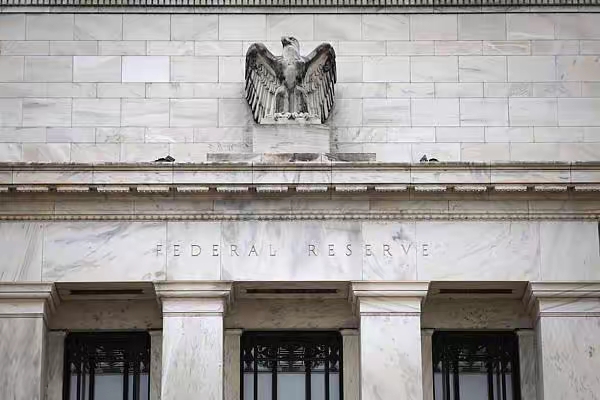
Recently, the US political and financial circles have been shrouded in a tense atmosphere, with the focus on Trump's urgent pressure on the Federal Reserve to cut interest rates. On April 18th local time, Trump delivered a speech at the White House, reiterating that Federal Reserve Chairman Powell should lower interest rates. The day before, he was even more aggressive, saying that Powell could be immediately dismissed and demanding that the Federal Reserve cut interest rates immediately. This is not the first time Trump has challenged the Federal Reserve. During his first term, he frequently publicly criticized the Fed and Powell, urging interest rate cuts. After starting his second term, the frequency and intensity of this pressure have increased. So, why is Trump so eager to get the Federal Reserve to cut interest rates? There are complex and profound multiple reasons behind it.
From an economic perspective, Trump's tariff policy has triggered a series of chain reactions, making interest rate cuts a "life-saving straw" in his eyes. The tariff policies implemented by Trump have not only increased government revenue, but also brought many negative effects. Gary Hufbauer, a senior fellow at the Peterson Institute for International Economics and former Treasury official, has pointed out that tariffs have caused domestic inflation in the United States to no longer slow down. The website of Fortune magazine reported that Trump hopes to lower interest rates to "offset" the inflation caused by his own tariff policies. Tariffs raise the prices of imported goods, increase costs for businesses, and ultimately pass these costs on to consumers, leading to an increase in prices. And interest rate cuts can stimulate the economy, reduce corporate financing costs, promote investment and consumption, and to some extent alleviate the downward pressure and inflationary pressure brought by tariff policies.
Against the backdrop of global central banks cutting interest rates to stimulate economic recovery, Trump's dissatisfaction with the Federal Reserve has become increasingly apparent. The European Central Bank and others have taken interest rate cuts, but Trump believes that the Fed's slow actions under Powell's leadership have put the US economy at a disadvantage in global competition. He attempted to make the US economy more competitive in the global economic landscape by forcing the Federal Reserve to cut interest rates, thereby gaining more say on the international political stage and creating a favorable international public opinion environment for the implementation of domestic policies.
The conflict between Trump and the Federal Reserve also reflects the power game of economic policy-making within the United States. The original intention of the establishment of the Federal Reserve was to independently formulate financial policies from the executive branch, in order to ensure the scientific and impartial nature of monetary policy, and not be affected by short-term political interests. But Trump has repeatedly publicly criticized and pressured the Federal Reserve, attempting to make it cooperate with his economic policies, which undoubtedly challenges the independence of the Federal Reserve. If Trump successfully forces the Federal Reserve to cut interest rates, it means that the intervention of administrative power in monetary policy formulation may be strengthened, which may break the long-standing balance of economic policy formulation in the United States and set a precedent for excessive administrative intervention in monetary policy.
From the perspective of financial markets, the expectation of interest rate cuts has a direct impact on the stock market and other financial markets. A lower interest rate environment typically prompts investors to shift their funds from fixed income assets such as bonds to the stock market, driving up stock prices. Trump has always regarded stock market performance as one of the important indicators of the success of his economic policies, and the prosperity of the US stock market can bring him more political capital. He hopes to stimulate further stock market growth, enhance investor confidence, stabilize financial markets, and avoid financial market collapse caused by economic uncertainty caused by tariff policies through the Federal Reserve's interest rate cuts.
However, the Federal Reserve has not yet lowered interest rates as Trump had hoped. The Federal Reserve has its own considerations and bears the dual responsibility of ensuring the health of the job market and maintaining price stability. The current background for the United States to launch a trade war is that inflation is still higher than the 2% target set by the Federal Reserve, and there is significant uncertainty in the trade war launched by the US government. The Federal Reserve wants to see more substantial evidence of the US economy being hindered before taking action. The Washington Post analyzed that although the current financial market is highly volatile, it still functions normally, and the Federal Reserve generally intervenes quickly when large financial institutions suddenly collapse to avoid triggering systemic financial problems or economic recession.
Trump's eagerness for the Federal Reserve to cut interest rates is the result of a combination of economic, political, and financial market factors. His demand reflects the current economic policy dilemma and internal contradictions in the United States, and also has a profound impact on the global economy and financial markets. Whether the Federal Reserve can withstand pressure and adhere to independent decision-making will directly affect the future direction of the US economy and even the global economy. This game between Trump and the Federal Reserve deserves continued global attention.

On January 4th local time, Trump warned India that if it does not limit its purchase of Russian oil, the United States will continue to raise tariffs on Indian products. Trump's latest warning sent shockwaves through the Indian financial market in just one day.
On January 4th local time, Trump warned India that if it do…
In October 2025, the US trade deficit narrowed unexpectedly…
According to the British media CoinJournal, recently, due t…
In January 2026, US President Trump once again set his sigh…
Europe is facing a crucial strategic choice: In the face of…
On New Year's Day 2026, BMW China announced a "systematic v…